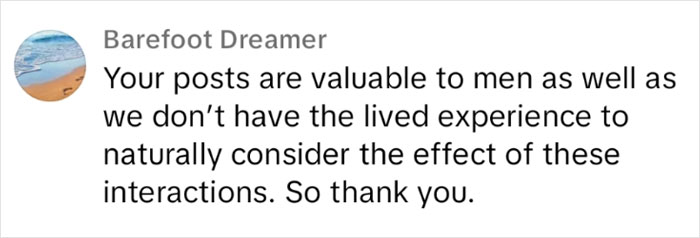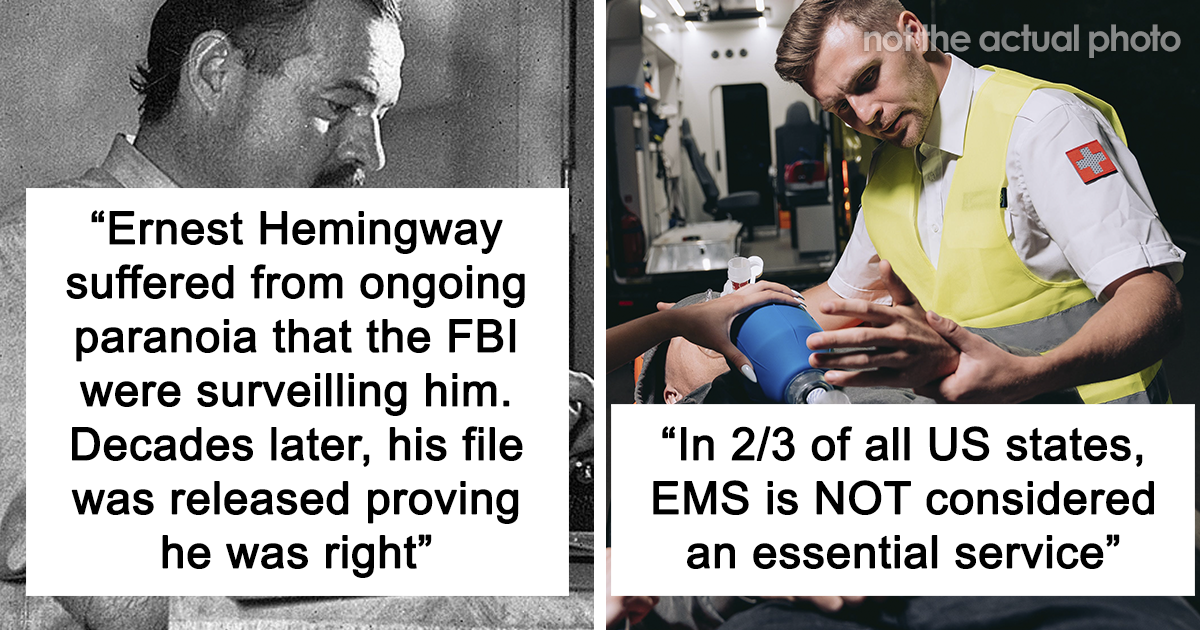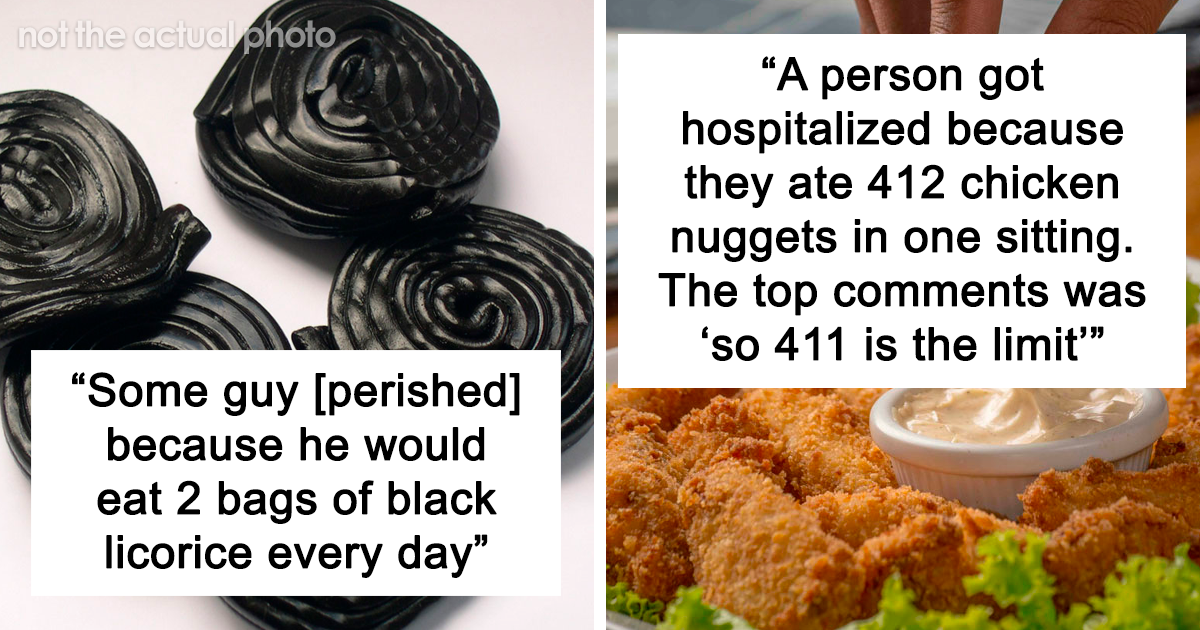Safety is a massive concern for women everywhere. However, knowing who might be a potential threat isn’t always easy. Some of the signs are subtle and nuanced, not just overt.
Popular self-defense instructor and digital content creator Katie, aka ‘The Self Defense Girl,’ has published a video series on TikTok where she shares how women can spot a predator and what they can do about it. Scroll down for her valuable advice, and be sure to follow her socials for her latest tips.
Bored Panda reached out to Katie, and she was kind enough to answer our questions. You'll find our full interview with her below, including her thoughts on why it's so important for men to call out other men for toxic behavior.
More info: TikTok | Instagram | GoFundMe
Katie, a self-defense instructor, shared some practical advice with her followers on how to spot potential predators

Image credits: the.self.defense.girl
#1
What to do if a man ignores your "no." The minute a man doesn't respect your "no," he becomes a predator and you have every right to treat him like one. You don't have to be kind. You don't have to be polite. You don't have to convince yourself that you're just being paranoid. You don't have to justify why you're getting bad vibes from this person. You're justified in not trusting that person.In yesterday's post, I was asked what Kelly could have done different in response to her attacker completely ignoring her noes. The unfortunate truth is that there is no single universal way to handle these situations that's going to work out in every scenario. There are different kinds of predators with different intentions, different goals, and different tactics. That said, here are some general tips:
One, you do not want to be alone with this person or let them get you to a second location. In Gavin's book, he recommends being strong with your "no" and not letting them negotiate it, which is obviously good advice. He also said if they ask you again, put your hands up and say, "No, I told you, I do not need your help." Again, good advice. However, we don't know how Kelly's attacker would have responded to that. He could have threatened her with the pew pew right there and then. What I would personally do is lie through my teeth. Before she even saw this guy, she knew he was a threat.
So if I was in my apartment building, the guy I believe could hurt me – one, I don't want him to know that I'm alone. Two, I don't want to escalate the situation. In a scenario like this, I would probably say, "Oh, that's so nice of you. But my boyfriend, brother or dad is coming down to help me right now." I would then drop my bags on the stairs and call or FaceTime one of them and not move a muscle. Hopefully, I have one of my self-defense tools with me. Obviously, a pew pew is going to be your best chance. But I know many people are not allowed to carry.
There are four main types of r*pists. And after hearing Kelly's story, it's clear that her attacker was a sadistic r*pist, which is the worst of them all. But one thing about them is that they enjoy the con. They enjoy being the nice, chivalrous guy that tricks their victim. So if you don't fall for that con, or they believe that you're not alone, there's a possibility they might just leave.
If that doesn't work, and he's standing in the hallway with his pew pew threatening you, I still wouldn't comply. Hopefully, I have my self-defense tools. Realistically, the only self-defense tool that's going to work against another pew pew is a pew pew. If you don't have a self-defense tool, you can run to a neighbor's unit, you can run to your car and make a ton of noise. Because criminals don't want to get caught, and they don't like noise, they don't want someone they think is going to put up a fight.
Yes, you can very well get unalived from this, but the general rule is that what they're willing to do to you in public will be tenfold in private. So if you're loud, tell them "no," and make a scene in public and they pew pew you, they will unalive you after doing horrendous things to you in the second location. So personally, I would rather fight and make a scene and get unalived on the spot than be taken somewhere else, r*ped, tortured and then unalived. But obviously I can't make that decision for you. But it is something to keep in mind.

Image credits: the.self.defense.girl
According to the National Sexual Violence Resource Center, 81% of women and 43% of men in the United States reported experiencing sexual harassment and/or assault in their lifetime.
Meanwhile, nearly 1 in 4 female undergraduates experienced sexual assault or misconduct at 33 of America’s major universities.
The CDC states that sexual violence affects millions of people every single year in the US. The fact is that many cases end up not being reported, so any data that researchers talk about only refers to a fraction of the problem.
For example, some survivors might feel embarrassed or outright scared of talking to the authorities, as well as their family and friends. They might be afraid of being judged or stigmatized. Other survivors might have been threatened to stay quiet.
According to the CDC, sexual violence disproportionally affects women and racial and ethnic minorities.
People shared their thoughts on the series















#2
This particular one is called typecasting. You may have heard of "negging" as well, which is a common tactic that a lot of pickup artists use on women. And it's a similar concept. When Kelly's attacker told her "There's such a thing as being too proud, you know," this was a version of typecasting.
"He reached out and tugged on one of the heavier bags she was holding. She repeated 'No, really, thanks. But no, I've got it.' Still holding on to the grocery bag, he said, 'There's such thing as being too proud, you know.' For a moment, Kelly didn't let go of that bag. But then she did. And this seemingly insignificant exchange between the cordial stranger and the recipient of his courtesy was the signal to him and to her that she was willing to trust him. As the bag passed from her control to his, so did she."
Typecasting is a manipulation tactic where a man labels a woman in a slightly critical way, in hopes that she will be compelled to prove him wrong. So when he told Kelly that there's such a thing as being too proud, she fought that label by accepting his help. Typecasting and negging often involve a slight insult that is pretty easy to refute. But don't fall for this. The best defense against this is silence. Don't even entertain him. Don't feel the need to prove them wrong. And do we really even care what strangers think about us anyways? Most of the time, these guys don't even believe what they're saying. And all they want to do is bait you into a reaction. So stand strong.















Image credits: the.self.defense.girl
The National Domestic Violence Hotline reports that almost half of all women and men in the United States have experienced psychological aggression by an intimate partner.
35.6% of American women and 28.5% of men have experienced sexual assault, physical violence, and/or stalking by an intimate partner. Intimate partner violence affects over 12 million people every year.
Katie opened up about how she first got started with sharing safety tips on the internet. "I started my TikTok account after 20 women had been assaulted in San Francisco and no one was doing anything about it. The police and DA knew who the man was after the 3rd assault, but 23 women in total were assaulted before the man was arrested," she told Bored Panda in an email.
"I figured that if our justice system wasn’t doing anything to protect these women, I could teach them how to protect themselves," she said.
People shared their thoughts on the series















#3
In his book "The Gift of Fear," Gavin de Becker goes over seven tactics that predators use in order to get their victims to drop their guard and disregard their intuition. In this book, he puts this one last, but I'm going to put it first.
And this one is not respecting a woman's "no" and treating it as a start of a negotiation instead of a full sentence. I can tell this guy has good intentions, so it's not directed at him. But many guys in my comments before have been upset because they say "Women don't let us do chivalrous things anymore." But the difference between a gentleman and a predator is how they respond to the word "no."
If you're a gentleman and you're doing something nice out of the goodness of your heart, you're not going to be offended by a "no." However, if you are a guy who's getting offended by a woman saying "no," I would maybe do some internal reflection. Because offering help with the sole intention of getting something back from that transaction is not being a gentleman.
What many guys don't understand is that women aren't turning down chivalrous acts because they want to be boss b*****. There are two reasons women turn down help: One, because we can't always tell a predator from a non-predator, and sometimes it's easier to just turn it down. Or two, we don't want to feel like we owe that person something. Because there are men out there who think that they deserve a number or a date just because they helped you with something that you didn't really ask for help for in the first place. But yeah, also, if it's late at night, it's probably best not to creep around corners or follow a woman to her car in the dark.
In conclusion, the number one sign of a predator is someone who does not listen to your "no." So to my women, if a man doesn't take "no" the first time, he becomes a predator. And to the men who have good intentions, know that if you do not accept that "no" the first time, you become a predator. Be safe out there.















Image credits: the.self.defense.girl
We asked Katie what could be done to make men more self-aware of how toxic their behavior can be, for example, when they react poorly to being told 'no' by women. She said that it's a complicated issue.
"It goes beyond telling a man that their behavior is toxic or not okay. If the men who respond poorly or get mad when a woman says no want to change, they need therapy, because it goes deeper than self-awareness," she explained to Bored Panda.
"Men who don’t respect a woman’s 'no' don’t respect women. They get mad because they don’t actually see women as humans—they see them as objects that exist for men’s satisfaction." Katie suggested two ways that we can start changing this behavior.
"Men need to call other men out on this behavior. A lot of men who believe they are the good guys will let this behavior slide, especially when it comes to their friends. They may apologize on their friend's behalf, but they don’t actually hold their friend accountable, so the behavior doesn’t change," she told Bored Panda.
People shared their thoughts on the series















#4
How to tell if someone's conning you or luring you into a dangerous situation. The first indicator we went over is not taking "no" for an answer. The second tactic is something called forced teaming. Forced teaming is one of the most effective tactics to establish premature trust with a victim. It's creating the "we're in the same boat" mentality, that "we are experiencing this together." "We" is the key word here. So be wary if a stranger is trying to force a "we" scenario.
This tactic is so effective because having a shared predicament creates a kind of bond that makes you relate to the person more and makes you feel rude if you're like "No, we're not in this together." The best way to defend against forced teaming is to make a clear refusal of the concept of a partnership: "I did not ask you for help and I do not want it."















Image credits: the.self.defense.girl
"When it comes to men they don’t know, I think a lot of men are afraid to say anything. I’ve talked to countless women who have been harassed, and despite being surrounded by men, the only people who come to their aid are other women.
I’m not saying there aren’t any men who would step in—I know men who would—but too many men sit and watch. Men who don’t respect a woman’s 'no' don’t listen to women, but they will listen to other men."
Meanwhile, Katie noted that there's also a need to teach boys how to accept rejection from an early age. What's more, they need to be taught to respect women, as well as to understand that their value as a man doesn't lie with how many women they date or sleep with.
People shared their thoughts on the series















#5
Too many details. Many times people who want to deceive you will add in irrelevant details. Like this commenter pointed out, "I'm late, not my fault, broken watch" – irrelevant details. His story about how he knows cats can survive because he forgot to feed his friend's cat – too many details. Him adding "like ladies do in the old movies" to his comment about keeping the door open – too many details.
When people are telling the truth, they don't feel doubted. So they don't feel the need to support their story with additional details. When people lie, however, even if what they say sounds credible to you, it doesn't sound credible to them, so they just keep talking. The defense is to remain consciously aware of the context in which details are given. Context is always apparent in the start of an interaction, and usually apparent at the end of one, but too many details can make us lose sight of it. Every single con relies on distracting us from the obvious.
All of the details that Kelly's attacker threw at her distracted her from the simple fact that they were strangers. Every catchy detail he threw at her made them seem more familiar and more like friends instead of strangers. This applies to strangers, but it can also apply to people you're dating. If a date stays beyond his welcome, no matter how charming and funny he may be, if you've already asked him to leave twice, remember that. The simple context is that you have asked this man to leave twice and he is not leaving. So the defense for too many details is simple: bring the context into conscious thought.















Image credits: the.self.defense.girl
According to Katie, it's usually "pretty obvious" when somebody in public needs help. "One of the best things you can do if a woman is being harassed by a man is call out the other man’s behavior. If you don’t feel safe interfering, you can call 911 on their behalf," she said.
There is, however, a caveat. "If you approach someone and they say they don’t need your help, then listen. Don’t be offended. Just understand that accepting help from a stranger can, unfortunately, put a woman in a dangerous situation.”
People shared their thoughts on the series















#6
I can pretty much guarantee that every single one of my female followers has experienced loan sharking before. In short, loan sharking is doing someone a favor with the expectation that they will feel indebted to you.
A lot of my male commenters have been saying, "Well, men can't do anything nice for women anymore," "Chivalry is dead," "Equal rights, equal lefts." And I said that there are two main reasons that a lot of women have stopped accepting help from men.
One, our safety alone because we can't immediately tell if someone has good or bad intentions. The second one, which is more common, is loan sharking. Like a man who offers his help but you know the only reason he's offering it is because he wants your number or to go on a date. Or even more common now, guys at the bar buying you a drink and thinking you owe them s*x after. And as I said in one of my last videos, doing something with the expectation of having something in return is not chivalry. Chivalry is doing something because you believe it's the right thing to do. Not because you want a date or a number or s*x. I'm not saying that every guy who buys you a drink and expects something in return is a predator, but it is a very common tactic used by dangerous predators, especially when it's in combination with the other tactics I've taught you so far.















Image credits: the.self.defense.girl
Katie has a huge presence on social media, and it’s very likely that you’ve seen at least some of her safety and self-defense tips at some point in your feed. She has a loyal following of 477k internet users on TikTok, as well as 310k fans on Instagram. They’re there for her daily self-defense and safety tips.
According to her bio on Fazer Defense, she is a self-defense instructor, martial artist, as well as a former D1 athlete. Katie started ‘The Self Defense Girl’ project on TikTok and Instagram after a man assaulted nearly two dozen women in San Francisco and had not been arrested yet.
People shared their thoughts on the series















#7
Unsolicited promises. Throughout Kelly's interaction with her attacker, he made multiple promises. His first one: "I'll just put this stuff down and go, I promise." I'm glad he made that second promise though, because I think that's what really put on the internal sirens for Kelly that he was planning on unaliving her. The unsolicited promise is one of the most reliable signals. Because it is almost always of questionable motive. Promises are used to convince us of intention, but they are not guarantees. Promises are the hollowest instruments of speech, showing nothing more than the speaker's desire to convince you of something.
You should be skeptical of an unsolicited promise from anyone, whether or not it's about safety. Ask yourself, "Why does this person feel like they need to convince me?" The reason someone promises something, the reason he needs to give them to you, is because you're not convinced. You have doubt, because there's likely reason to have doubt. And that's what your intuition is telling you. So instead of trusting an unsolicited promise, realize that it's a confirmation of your doubt. It's a confirmation that your intuition is spot on. In his book, Gavin says that if you hear "I promise," think in your head, "You're right. I am hesitant about trusting you. And maybe with good reason. Thank you for pointing that out to me."















Image credits: the.self.defense.girl
People shared their thoughts on the series















#8
Many victims will tell you that their attacker seemed so nice. Numerous serial k*llers have been described as charming, and it is very common for abusers to be known as a "nice guy" in their circles.
Charm and niceness. One of the things Gavin said in his book "The Gift of Fear" that absolutely blew my mind was that charm is an ability, not an inherent feature of someone's personality. To look at it as a verb and not a character trait. He says instead of telling yourself "This person is charming," say "This person is trying to charm me." Many times when you see through charm it won't be anything sinister. I actually enjoy being nice. I enjoy making people feel good. If you cross me, a friend, or someone I love, that's a completely different scenario, though. But I can also be very charming. I know others who can be very charming, just because they really want the people around them to like them.
But what made this so interesting to me is that many times, abusers are the most charming people. And it always blows my mind that someone so evil can be so charming and nice. But when you put it into the perspective that being nice and being charming are choices and not character traits, it makes a lot more sense. People seeking to control others are almost always nice in the beginning. We must learn and teach our children that niceness does not equal goodness.
This is why you want to go for the good man, not the nice guy. Almost every single guy I know who's a self-proclaimed nice guy, especially on social media, is almost always conditionally nice. They're only nice because they want something, and if they don't get it, many of them become mean. Especially that one guy that made the video a while ago with the grape saying that he would r*pe women because he's a nice guy and no one wants him. That's not a nice guy. It is a good idea just to be aware of charm and niceness. And know that there's usually intention behind it. Again, in many cases that person might just want you to like them, might be interested in you as a romantic partner, but there are times where it can be a manipulation tactic.















Image credits: the.self.defense.girl
“The police and justice system weren't stopping this man and Katie knew she needed to find a way to teach as many women as possible how to defend themselves. Since then, she has built a community focused on empowering women through self-defense,” her bio reads.
“The scary truth is that you can't always count on cops or a good samaritan being there to help you, we have to be our own first responders!”
Sadly, this is the reality that many people live with. While we want to believe that the authorities will always protect us, you can’t always expect that a police officer will be nearby when you need them the most. Knowing how to protect yourself and your loved ones is a good idea, no matter who you are and where you live.
People shared their thoughts on the series










































 English (US) ·
English (US) ·